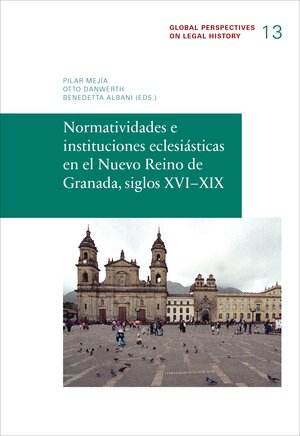
×
![Buchcover ISBN 9783944773247]()
Normatividades e instituciones eclesiásticas en el Nuevo Reine de Granada, siglos XVI-XIX
herausgegeben von Pilar Mejía, Otto Danwerth und Benedetta AlbaniEcclesiastical institutions and actors played key roles in the formation of normative orders in early modern Ibero-America. However, both legal historiography, due to its strong legalistic, state-centered imprint, and general historiography on the colonial period, more inclined towards secular law, have only rarely discussed the contribution of ecclesiastical normativity to the formation of what came to be called ‘derecho indiano’.
In light of that situation, the Max Planck Institute for European Legal History organised a series of seminars in different Latin American cities in order to offer an interdisciplinary forum dedicated to the research of ecclesiastical normativities and institutions in Ibero-America between the 16th and 19th centuries. The present volume (in Spanish) is the third in a four-book series that documents the – peer-reviewed – results of this series of seminars held in Mexico City, Lima, Bogotá, and São Paulo.
This book, the result of the seminar in Bogotá, is dedicated to the religious norms and institutions in the territories that made up the New Kingdom of Granada, in what is now Colombia, Venezuela and Ecuador. The nine contributions focus not only on the centre of the archdiocese in Santafé but also examine the dioceses of Popayán, Santa Marta and Cartagena. The particular experiences of, and conflicts between, royal officials and members of the regular and secular clergy led to some cases from New Granada becoming precedents in the development of new forms of evangelisation and missionary practices.
The first part of the book, dedicated to the colonial period, includes contributions on the difficult implementation of linguistic policies at the end of the 16th century; the ambiguous role of the Jesuits in the secularisation of the clergy during the first half of the 17th century; parish administration and its economic aspects; and the impact of the Bourbon Reforms on the Dominicans during the second half of the 18th century. Several studies deal with educational centres: the Universidad Santo Tomás and the Real Colegio de San Bartolomé de Santafé, where the neo-Granadine elites were educated, but also the Dominican Convent of San José de Cartagena de Indias, with its frequent problems to re-establish the discipline of the missionaries in a commercial port.
The volume’s second part is dedicated to the 19th century. An analysis of the transformation of the role of oaths in judicial processes is followed by two studies on the relationship between state and church: the first offers a new view of the republican patronato as a form of continuity of the royal patronato in Colombia; the second explores the religious question of political languages during the crisis of Venezuelan colonial society and the struggle for independence.
The volume allows us to observe how different types of normative knowledge were produced and adapted in the religious field, how they developed in the New Granada context, and how they were linked to global debates. Situated in the shadow of the two traditional viceroyalties, New Spain and Peru, the New Kingdom of Granada can be seen as peripheral in many ways. However, the studies in this volume show that these territories actually form a key region for the analysis of the emergence, production and cultural translation of normativities. In New Granada, new practices of evangelisation were developed, and interactions and discussions took place between clergy and royal officials who would carry their formative experiences with them as they continued their careers in other parts of the empire.
In light of that situation, the Max Planck Institute for European Legal History organised a series of seminars in different Latin American cities in order to offer an interdisciplinary forum dedicated to the research of ecclesiastical normativities and institutions in Ibero-America between the 16th and 19th centuries. The present volume (in Spanish) is the third in a four-book series that documents the – peer-reviewed – results of this series of seminars held in Mexico City, Lima, Bogotá, and São Paulo.
This book, the result of the seminar in Bogotá, is dedicated to the religious norms and institutions in the territories that made up the New Kingdom of Granada, in what is now Colombia, Venezuela and Ecuador. The nine contributions focus not only on the centre of the archdiocese in Santafé but also examine the dioceses of Popayán, Santa Marta and Cartagena. The particular experiences of, and conflicts between, royal officials and members of the regular and secular clergy led to some cases from New Granada becoming precedents in the development of new forms of evangelisation and missionary practices.
The first part of the book, dedicated to the colonial period, includes contributions on the difficult implementation of linguistic policies at the end of the 16th century; the ambiguous role of the Jesuits in the secularisation of the clergy during the first half of the 17th century; parish administration and its economic aspects; and the impact of the Bourbon Reforms on the Dominicans during the second half of the 18th century. Several studies deal with educational centres: the Universidad Santo Tomás and the Real Colegio de San Bartolomé de Santafé, where the neo-Granadine elites were educated, but also the Dominican Convent of San José de Cartagena de Indias, with its frequent problems to re-establish the discipline of the missionaries in a commercial port.
The volume’s second part is dedicated to the 19th century. An analysis of the transformation of the role of oaths in judicial processes is followed by two studies on the relationship between state and church: the first offers a new view of the republican patronato as a form of continuity of the royal patronato in Colombia; the second explores the religious question of political languages during the crisis of Venezuelan colonial society and the struggle for independence.
The volume allows us to observe how different types of normative knowledge were produced and adapted in the religious field, how they developed in the New Granada context, and how they were linked to global debates. Situated in the shadow of the two traditional viceroyalties, New Spain and Peru, the New Kingdom of Granada can be seen as peripheral in many ways. However, the studies in this volume show that these territories actually form a key region for the analysis of the emergence, production and cultural translation of normativities. In New Granada, new practices of evangelisation were developed, and interactions and discussions took place between clergy and royal officials who would carry their formative experiences with them as they continued their careers in other parts of the empire.



